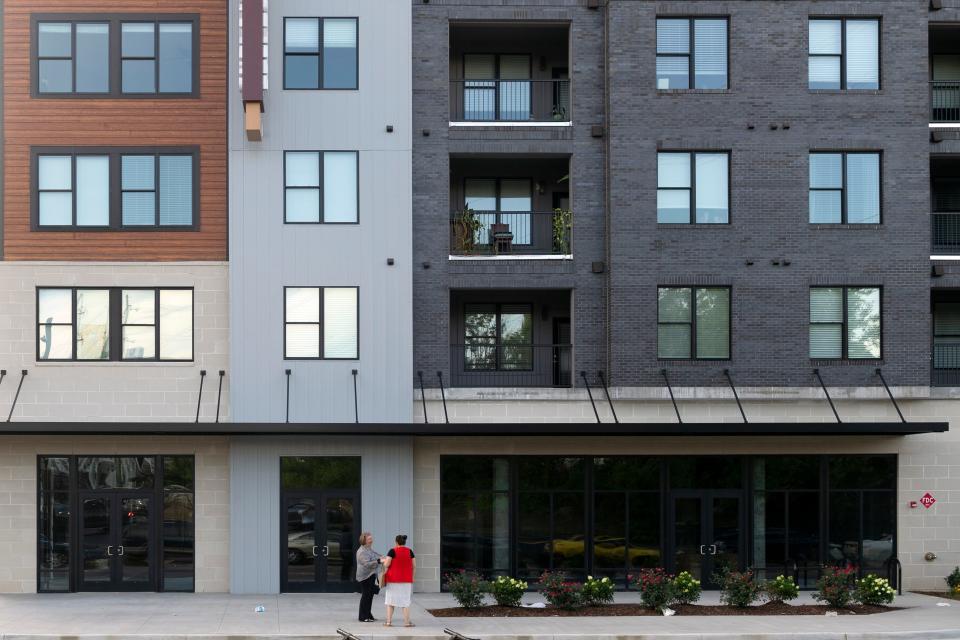Why does Knoxville have so many luxury apartments? For one, the term is 'way overused'
When you hear "luxury apartment," what do you think?
"Expensive" is probably your first thought, but let's be honest: almost all Knoxville apartments feel that way right now. Maybe you think of top-tier appliances or amenities, like smart thermostats or gated parking, but those don't make apartments "luxury" on their own either.
As Knoxville's housing needs increase with its growing population and a new desire to live downtown, the rental market seems to be adding more luxury apartments, which should be defined as larger units in architecturally interesting buildings located in desirable areas.
But what some landlords call luxury doesn't always meet the textbook definition for what's technically considered luxury or "class-A" apartments.
In addition to their size and location, class-A apartments typically have a variety of amenities to make life more enjoyable. Think pools, state-of-the-art gyms and dog parks.
Apartments classified as "luxury" on Apartments.com include Marble Alley Lofts, Church + Henley and Stockyard Lofts, all in the downtown area where most luxury apartments can be found. There's a combined 637 apartments among those three buildings.
As of 2020, there were 2,479 people and 1,794 housing units in the 37902 ZIP code, according to the U.S. Census Bureau. However, both of those figures likely have grown, as new apartments have been built and people have moved to Knoxville. Church + Henley was built in 2023.
But despite its reputation, Church + Henley does not list itself as luxury because co-owner Rick Dover feels the term is misleading.
"To me, that's one of those words that gets way overused, overpromised and underdelivered on an unfortunately high level of incidents," he said.

Dover said the Church + Henley building offers top-of-the-line amenities inside the apartment and throughout the building, such as wrap-around balconies, private parking spaces, a pool, a business center ? even a yoga room.
Church + Henley has among the most expensive apartment units in Knoxville, with monthly rates ranging from $1,800 for studios to $7,500 for the priciest two-bedroom, two-bathroom units. The highest-priced units, though, are the exception and there are two-bedroom units that top out at $4,500 a month.
The average rent for all class-A apartments in Knoxville (from studio to four-bedroom) was $1,824 per month as of April 2024, according to data from the East Tennessee Realtors.
That's 1.95% higher than class-A rent prices in April 2023.
If you're looking for a luxurious lifestyle and see a building advertised as "luxury," make sure you take a look for yourself. If the unit seems luxurious to you and is worth the price of rent, then congratulations: you found a luxury apartment!
Know Your Knox answers your burning questions about life in Knoxville. Want your question answered? Email [email protected].
Silas Sloan is the growth and development reporter. Email [email protected]. X, formerly known as Twitter @silasloan. Instagram @knox.growth.
Support strong local journalism by subscribing at knoxnews.com/subscribe.
MORE QUESTIONS ANSWERED BY KNOW YOUR KNOX
Why are Knoxville fire hydrants blue and yellow?
If you've noticed all the blue and yellow fire hydrants along streets around Knoxville, you've probably wondered why they're not the traditional picture-book red. Or, better yet, why aren't they orange and white in keeping with the city's Vols spirit? And what about the other color combos that pop up around town? Hayden Dunbar paints a colorful story to answer those questions.
Why are there so many houses of worship along Kingston Pike?
Sometimes called the "Miracle Mile," the shaded two-mile stretch of Kingston Pike east of Bearden is home to 10 different houses of worship. Allie Feinberg explains why the placement of churches and synagogues among the stately older houses is not a coincidence.
How did Farragut fend off Knoxville annexation and become its own town?
During the 1970s and '80s, Knoxville was busily annexing parts of the county outside the city limits, notably slices of commercial corridors that could bring in extra sales tax revenue. It took a court battle, but Farragut held out and eventually became its own town. Tyler Whetstone recounts how it happened.


This article originally appeared on Knoxville News Sentinel: Luxury Knoxville apartments not always listed accurately for renters
